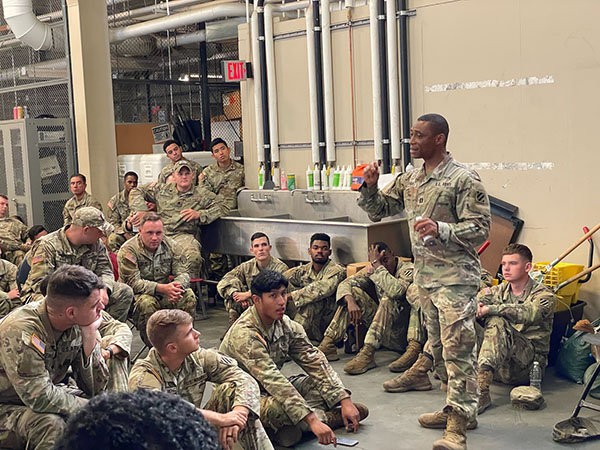
Photo by Capt. Sean Minton
Chap. (Capt.) Michael Ohama, the battalion chaplain for 2nd Battalion, 69th Armor Regiment, 2nd Armored Brigade Combat Team, 3rd Infantry Division, discusses spiritual and emotional fitness as part of the brigade’s foundational day training on suicide awareness/intervention, Sept. 9 on Fort Stewart.
Holistic health event focuses on suicide prevention
“A very high level of participation and engagement,” was the overall feedback received from Soldiers, providers and facilitators during last week’s Spartan Foundational Day training.
It is National Suicide Prevention Month and Fort Stewart’s Spartan Brigade, 2nd Armored Brigade Combat Team, 3rd Infantry Division, showed commitment to the Army’s objective of zero suicides by participating in holistic health and fitness training, Sept. 9. The objective of this event was for leaders to engage with Soldiers and strengthen the Soldier’s ability to use the support of the embedded behavioral health team and others on the installation who are here to support their resiliency and wellness. The outcome goals for our Spartans were to be aware of and educate others about ways to prevent suicide and substance misuse and the abundant resources within reach at Fort Stewart.
Spartan leaders balanced between meeting mission requirements and allocating time and space for their Soldiers to learn ways to improve holistic fitness. They recognized that improving Soldiers’ coping skills to combat stress is as important as certifying their gunnery proficiency, resulting in being physically fit, expertly trained and mentally tough.
“The Spartan Foundational Day integrating H2F and suicide prevention training was timely for the Panther Battalion's upcoming intensive training cycle,”said 2nd Battalion, 69th Armor Regiment, 2nd ABCT, 3rd ID, operations noncommissioned officer, Sgt. Maj. Adolfo F. Dominguez. “The training will individually test the stress coping mechanisms of [our] Soldiers and possibly identify areas for growth. The hope is that the foundational day integrated training allows Panthers to be educated on the resources, life skills and tools available to them for the ongoing development of individual resilience, which then strengthens the whole team.”
The 2nd ABCT medical operations officer and planner, 1st Lt. Patrick Patterson, planned and coordinated with other battalion medical officers to ensure all training objectives were met. Overall, a team of 40 experts came together to ensure the training was successful.
Representatives included the unit ministry team; counselors from the Military and Family Life Counseling Program; Soldiers certified in master resiliency training; Substance Use Disorder Clinical Care, and behavioral health providers. Ready and Resilient Performance Center representatives and the Army Substance Abuse Program, were also on hand during the event.
During the training, each discipline had an opportunity to introduce their team members and provide an overview of their capabilities and how they can help Spartans reduce stress and optimize their performance. For instance, Spartan Soldiers and leaders were informed that R2 Performance trainers can provide training that is tailored to fit their needs, such as delivering team building training in the field.
Emily Thompson, an R2 Performance trainer reflected, “It was a great opportunity for the Soldiers to learn a bit more about the available resources and how we can assist in overall readiness.”
During the training provided by the MFLC, Anya Montefiore, the Spartans were surprised to learn that MFLC capabilities include support in understanding the real causes of stress, changing to healthier habits and understanding important elements of resolving conflicts.
“To understand a Soldier’s protective factors, we must start with one basic concept – knowing those in our squad, platoon, and company,” Montefiore said. “We have to empower those around to see themselves as worthy but also understand that sometimes this is a challenge based on past and current experiences.” Wright and her team also encouraged Soldiers to “create a social circle where they can be open, vulnerable, and willing to ask and receive help.”
At the end of the training, each command team participated in two vignettes that were based on real-life cases with prompts to facilitate a discussion with Behavioral Health providers.
The discussion-based format provided opportunity to test our Soldiers’ knowledge about warning signs and risk factors that are associated with suicide attempts.





